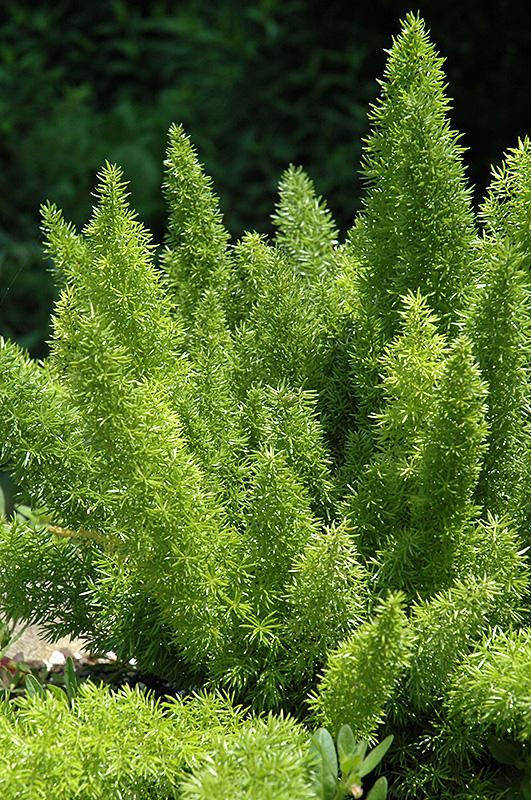Height: 30 inches
Spread: 4 feet
Sunlight:
![]()
![]()
Hardiness Zone: 8
Other Names: Myers Foxtail Fern; Cat's Tail
Description:
Feathery and soft, this variety of asparagus native to South Africa creates great visual interest when massed; flowers are short lived and are hidden behind foliage therefore not very noticeable; this variety is a robust grower great for containers
Ornamental Features
Foxtail Fern is primarily grown for its highly ornamental fruit. It features an abundance of magnificent red berries from mid to late summer. Its attractive tiny needle-like leaves remain light green in color throughout the season.
Landscape Attributes
Foxtail Fern is a dense herbaceous perennial with an upright spreading habit of growth. It brings an extremely fine and delicate texture to the garden composition and should be used to full effect.
This is a relatively low maintenance plant, and is best cleaned up in early spring before it resumes active growth for the season. It has no significant negative characteristics.
Foxtail Fern is recommended for the following landscape applications;
- Accent
- Mass Planting
- General Garden Use
- Container Planting
Planting & Growing
Foxtail Fern will grow to be about 30 inches tall at maturity, with a spread of 4 feet. It grows at a medium rate, and under ideal conditions can be expected to live for approximately 15 years. As an herbaceous perennial, this plant will usually die back to the crown each winter, and will regrow from the base each spring. Be careful not to disturb the crown in late winter when it may not be readily seen!
This plant does best in full sun to partial shade. It does best in average to evenly moist conditions, but will not tolerate standing water. It is not particular as to soil pH, but grows best in rich soils, and is able to handle environmental salt. It is somewhat tolerant of urban pollution. This species is not originally from North America.
Foxtail Fern is a fine choice for the garden, but it is also a good selection for planting in outdoor pots and containers. With its upright habit of growth, it is best suited for use as a 'thriller' in the 'spiller-thriller-filler' container combination; plant it near the center of the pot, surrounded by smaller plants and those that spill over the edges. It is even sizeable enough that it can be grown alone in a suitable container. Note that when growing plants in outdoor containers and baskets, they may require more frequent waterings than they would in the yard or garden. Be aware that in our climate, most plants cannot be expected to survive the winter if left in containers outdoors, and this plant is no exception. Contact our experts for more information on how to protect it over the winter months.







